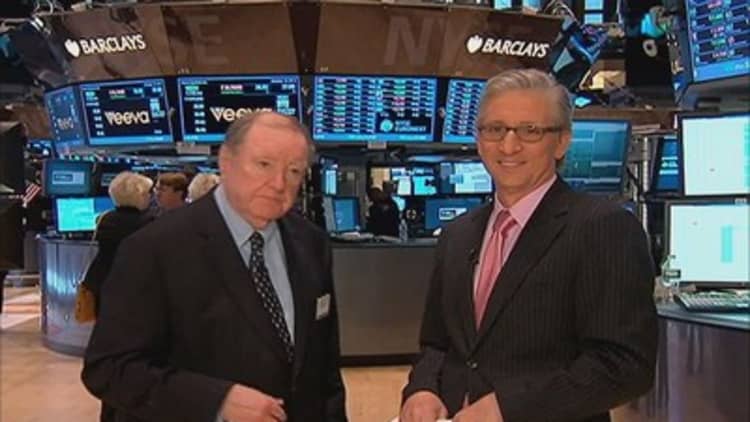Wall Street's bulls may be partying hard on the prospect of a Washington debt deal, but the actual vote is likely to trigger a "sell the news" letdown.
Stocks rallied Wednesday after reports that Congress would fast track a compromise bill expected from the Senate, and that House Speaker John Boehner would shepherd the bill through the House with the help of Democrats.
The Dow rocketed to 15,373, a 1.4 percent or 205-point gain Wednesday, a more than 650 point increase from its low of 14,719 just a week ago. The was up 1.4 percent, and the Nasdaq gained 1.2 percent to 3839.
"If there's a deal tonight, I think you're going to get a little bit of selling on the news. You've got the realization that the earnings season thus far has been ignored and is lackluster," said Art Hogan of Lazard Capital Markets. "We're going to get the 'all clear' signal from Washington, but we're not going to get the 'all clear' signal from corporate America."
With the reopening of the government, the market will also get a better look at how the economy is performing since important economic data will again be available.

(Read more: Reid: Deal reached to end shut down, raise debt ceiling)
The S&P 500 rose 23 points to 1721, just eight points away from its record high reached Sept. 19. The Russell 2000 was up 1.2 percent at 1092, an all-time high Wednesday.
"The crazy thing is the market is now above where it was before this whole mess started. The market assumes there was no long-term damage done from this," said Peter Boockvar, chief market analyst at the Lindsey Group.
(Read more: Prospect of deal eases pressure on short-term Treasury market)
Boockvar noted that fewer companies were reporting above consensus earnings this quarter than in previous quarters. Over the past four quarters, an average 66 percent of all S&P 500 companies beat earnings estimates. As of Wednesday morning, 57 percent of the S&P 500 companies reporting beat earnings estimates and 55 percent beat revenue forecasts, according to Thomson Reuters.
"If you assume, the shutdown occurred on October 1st, we're actually now 1.5 percentage points ahead of where we were on the close on the first. So the rally Friday closed that gap, so it would seem to me the market is not only not concerned about default, but investors are looking past the default and perhaps warming up to those $85 billion monthly injections," said Jack Ablin, CIO of BMO Private Bank.
The Fed in September opted to continue its $85 billion monthly bond buying, even though many Wall Street analysts and economists had expected it to begin tapering those purchases.
"Meanwhile, earnings are really kind of tepid so far. What bothers me is we see earnings growth of 2 percent this quarter, 2 percent next quarter and then by some miracle, we're expected to see 8 percent growth in Q1," he said.
Ablin said he has been putting money to work in European and other developed nation stocks, but not adding to U.S. holdings for now.
"I share the enthusiasm and I'm going to ride the momentum and we haven't pulled back anything," said Ablin, but he added that the Fed may be easing too much.
"There probably will be a sigh of relief. We could see a potential rally if a deal is done, but who knows, and I think the longer we trade on liquidity, the longer this rally will go. But the minute we start focusing on earnings and revenues, our market could be vulnerable," he said.
Some analysts expect the market to go through a choppy phase as the earnings season gets into full swing. But another factor that may temper some concerns for stocks is the possibility the Fed could keep its super easy posture until 2014, if it finds the government shutdown hurt the economy.
"A temporary deal pushes it out but it doesn't remove the uncertainty," said Hogan. "That means you're not going to get it at Janet Yellen's first meeting. That puts it sometime into 2014." Fed Vice Chair Yellen is expected to replace Fed Chairman Ben Bernanke in January.
But Hogan said it's unlikely she would slow the quantitative easing program at her first meeting. Analysts are increasingly expecting the Fed to hold off until 2014 to taper bond buying because of the uncertainty caused by Washington.
Gary Thayer, chief macro strategist at Wells Fargo Advisors, said there is probably limited upside for the market for the rest of the year. His year-end target is 1,650 to 1,700 on the S&P 500. The index is up 20 percent this year.
"We expect to see higher highs next year but after the strong start to the year, that was the risk. We exhausted a lot of the potential for the year early in the year," he said. The economy has been growing slower than expected in the second half, and the government shutdown probably also had an impact. "That's a bit of a change looking into next year, if we're starting off with low momentum."
If the Senate compromise bill passes, Congress will have to revisit funding the government in January and the debt ceiling in February. That will be a continued headwind, he said. "It's clear we won't be seeing smooth sailing, but it doesn't mean we can't advance," he said.
The Treasury has said the debt ceiling would be reached Oct. 17 if Congress did not take action.
—By CNBC's Patti Domm. Follow her on Twitter @pattidomm.


